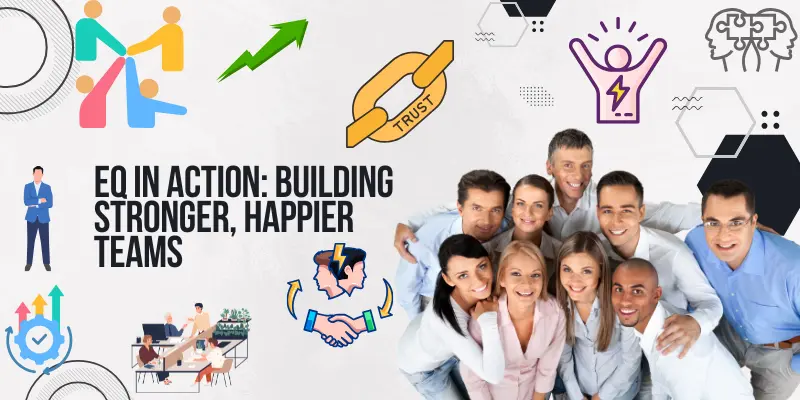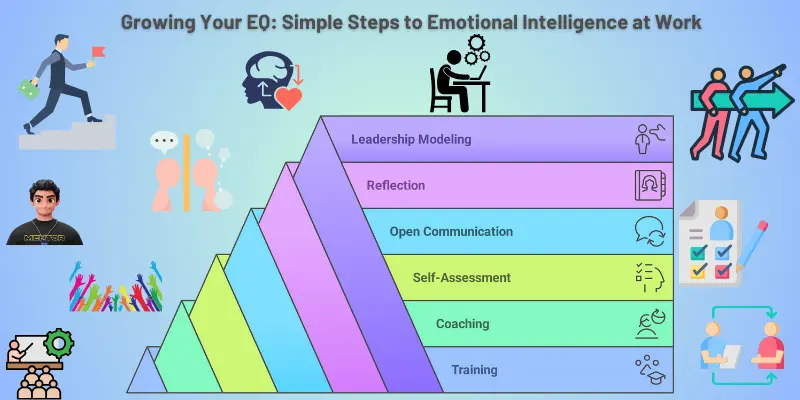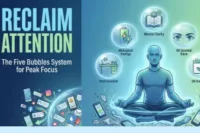The Power of Emotional Intelligence in the Workplace: Why EQ Matters More Than Ever
Published: 27/03/2025
Think about a time when a tricky situation at work could have gone either way—maybe a disagreement or tight deadline. Some people handle these with ease, while others seem to escalate things. The difference? It often comes down to emotional intelligence (EQ).
EQ is about understanding and managing your own emotions, as well as recognizing emotions in others. It helps you respond better, communicate clearly, and work well under pressure.
Studies show that high EQ is linked to success in the workplace. TalentSmart found that 90% of top performers have high EQ, and those with strong emotional intelligence earn more and build better relationships (TalentSmart, 2021).
Today, technical skills are important, but emotional intelligence can be the key to navigating office dynamics, handling stress, and leading teams effectively. Whether you’re managing a project or resolving a conflict, EQ helps you do it all with ease.
In this post, we’ll explore why EQ matters now more than ever and how you can improve your emotional intelligence to boost your career. By the end, you’ll understand how EQ can improve your communication, decision-making, and relationships.
Ready to improve your EQ? Let’s dive in and see how it can transform the way you work.
- Better Communication: EQ helps you express ideas clearly, listen actively, and connect with others on a deeper level.
- Stronger Teams and Leadership: By managing emotions effectively, you can build trust, resolve conflicts, and lead with empathy.
- Happier, More Productive Workdays: EQ reduces stress, boosts job satisfaction, and helps you stay focused and motivated.
What is Emotional Intelligence? (And Why It’s Your Secret Superpower)
Emotional intelligence (EQ) is about being in tune with your emotions and using that awareness to build stronger relationships and make better decisions. EQ isn’t just a soft skill—it directly impacts your success in the workplace. To break it down, EQ consists of five key components:
- Self-awareness: Recognizing and understanding your own emotions. This means being honest with yourself about what you’re feeling and why. For example, acknowledging when you’re stressed or frustrated allows you to respond thoughtfully, rather than reacting impulsively.
- Self-regulation: The ability to manage your emotions, especially in difficult situations. It’s about staying calm and composed even when things don’t go as planned. For instance, if you’re upset by a colleague’s comment, self-regulation helps you pause before responding, preventing emotional outbursts.
- Motivation: Using your emotions to drive you towards your goals. Motivated individuals often maintain a positive attitude and stay focused, even when faced with setbacks. In the workplace, this might look like pushing through challenging tasks because you’re passionate about the outcome.
- Empathy: Understanding and sharing the feelings of others. Empathy allows you to connect with colleagues on a deeper level, whether it’s understanding their stress or celebrating their achievements. This skill is crucial for teamwork and conflict resolution.
- Social skills: The ability to manage relationships effectively. This includes communication, listening, and influencing others. Strong social skills help you collaborate, negotiate, and resolve conflicts, all of which are essential for a healthy work environment.
Each of these components plays a role in how we interact with others and how we handle challenges. A high EQ leads to better relationships, smoother teamwork, and stronger leadership—making it an essential trait in today’s workplace.
How EQ Transforms Teams: Building Stronger, Happier Workplaces
High emotional intelligence (EQ) can make a world of difference when it comes to how teams work together. Whether you’re collaborating on a project or managing a group of people, EQ is key to building strong, cohesive teams. Here’s how it impacts team dynamics:

- Improved Collaboration: Team members with high EQ are better at understanding each other’s emotions, leading to smoother communication and fewer misunderstandings. This creates an atmosphere where everyone feels heard and valued, which boosts collaboration.
- Conflict Resolution: In any team, disagreements will happen. However, when team members have strong EQ, they can handle conflict more effectively—keeping things calm and focused on finding solutions rather than getting stuck in the problem. High EQ individuals are more likely to find common ground and compromise.
- Better Communication: EQ helps team members express themselves clearly and listen attentively. Effective communication ensures that everyone is on the same page, preventing mistakes and promoting transparency.
- Enhanced Trust: When people are emotionally intelligent, they build trust more easily. High EQ individuals are often seen as more approachable and reliable, making it easier to develop strong, trusting relationships within a team.
- Increased Team Morale: When emotions are managed well, there’s less tension and more positive energy in the group. Teams with high EQ tend to be more supportive, which boosts overall morale and motivates everyone to contribute their best work.
In short, EQ helps teams function more harmoniously, resolving issues before they escalate and ensuring that everyone feels connected and motivated to succeed together.
EQ and You: How Emotional Intelligence Boosts Personal Success
Emotional intelligence (EQ) isn’t just important for getting along with others—it also has a direct impact on your own performance at work. When you understand and manage your emotions, you’re better equipped to handle challenges, make sound decisions, and stay on top of your goals. Here’s how EQ boosts personal performance:
- Stress Management: EQ helps you recognize when you’re feeling overwhelmed and provides tools to manage those emotions. High EQ individuals are better at staying calm under pressure, allowing them to think clearly and make better decisions, even in stressful situations.
- Improved Decision-Making: Being emotionally aware means you’re not making decisions based solely on impulse or stress. Instead, you can pause, consider your emotions, and think rationally about your choices. This leads to more thoughtful, balanced decisions, especially when stakes are high.
- Increased Focus: Emotional intelligence allows you to stay grounded and focused, even when distractions or emotional reactions try to pull you off course. People with high EQ are better at prioritizing tasks and staying productive, even when faced with challenges.
- Resilience: EQ helps you bounce back from setbacks. When things don’t go as planned, emotionally intelligent individuals are better at processing their feelings, learning from their mistakes, and using those experiences to improve moving forward. Leaders with high EQ are 12% more productive because they stay focused and driven, even when things get tough.
- Stronger Self-Motivation: EQ fuels your inner drive. When you understand what motivates you emotionally, you can channel that energy to stay committed to your goals and push through obstacles.
Growing Your EQ: Simple Ways to Improve Emotional Intelligence at Work
Emotional intelligence (EQ) can be developed with intention and practice, both for individuals and organizations. Improving EQ helps create a more supportive, communicative, and productive work environment. Here are some practical ways to develop EQ in the workplace:

- Training and Workshops: Offering EQ-focused training sessions helps employees understand the value of emotional intelligence and how to apply it in their day-to-day work. Workshops can cover topics like active listening, conflict management, and emotional regulation.
- Coaching and Mentoring: One-on-one coaching can help individuals develop their EQ by focusing on specific areas such as self-awareness or empathy. Mentoring programs where senior employees model emotional intelligence also allow for learning through example.
- Self-Assessment Tools: Encouraging employees to assess their own emotional intelligence can be an eye-opening experience. Tools like EQ tests or reflection exercises allow individuals to identify their strengths and areas for improvement.
- Promote Open Communication: Fostering an environment where feedback is given and received constructively can help individuals develop their emotional awareness. Open communication helps employees feel comfortable discussing their emotions and challenges, making it easier to address issues before they escalate.
- Regular Reflection: Encourage employees to take a few minutes each day or week to reflect on their emotional responses and interactions. Keeping a journal or simply taking time to check in with their feelings can help them improve self-regulation and self-awareness over time.
- Model EQ at Leadership Levels: Leaders can set the tone for emotional intelligence in the workplace by modeling it themselves. When managers and executives demonstrate empathy, active listening, and self-regulation, it encourages employees to do the same.
Developing emotional intelligence in the workplace is an ongoing process that benefits everyone. By investing in EQ development, organizations can create a healthier, more productive environment where both individuals and teams thrive.
How Emotional Intelligence Transforms Organizations
Emotional intelligence (EQ) isn’t just a personal skill—it’s a secret weapon for organizations. When companies prioritize EQ, they create workplaces where people thrive, teams excel, and customers feel valued. Let’s break down how EQ makes a real difference at the organizational level:
Better Teams, Bigger Ideas: EQ Fuels Collaboration
- What Happens: Teams with high EQ communicate better, share ideas openly, and work together more effectively.
- Why It Matters: Collaboration is the backbone of innovation. When people feel understood and respected, they’re more likely to contribute their best ideas.
- Example: Imagine a team where everyone listens actively, respects different perspectives, and resolves conflicts calmly. That’s the power of EQ in action.
Keeping Talent Happy: EQ Boosts Employee Retention
- What Happens: Employees stay longer in organizations that value their emotional well-being and provide supportive environments.
- Why It Matters: High turnover is costly—both financially and culturally. EQ helps create a workplace where people feel appreciated and motivated to stay.
- Stat: Companies with high EQ cultures report 20% lower turnover rates.
Turning Customers into Fans: EQ Enhances Client Relationships
- What Happens: Employees with high EQ understand customer needs, handle complaints gracefully, and build stronger connections.
- Why It Matters: Happy customers mean repeat business and positive word-of-mouth. EQ turns transactions into relationships.
- Example: A customer service rep uses empathy to resolve a frustrated client’s issue, turning a negative experience into a loyal customer.
The Big Picture: EQ Drives Profitability
Stat: Organizations with high EQ cultures are 20% more profitable. Why? Because EQ leads to happier employees, stronger teams, and satisfied customers—all of which boost the bottom line.
Watch Out! Common EQ Mistakes (and How to Fix Them)
While emotional intelligence (EQ) is a powerful tool for success, there are a few common pitfalls people can fall into when trying to develop it. Recognizing and addressing these pitfalls can help you avoid setbacks and make your EQ growth more effective. Here are some common mistakes and how to avoid them:
- Over-Empathizing: While empathy is a key component of EQ, it’s possible to take it too far. Over-empathizing can lead to emotional burnout or neglecting your own needs. It’s important to balance empathy with self-care and boundaries, ensuring you’re emotionally available without becoming overwhelmed.
- Ignoring EQ in Hiring: Many organizations focus primarily on technical skills during the hiring process, overlooking the emotional intelligence of candidates. Hiring someone with strong technical abilities but low EQ can create friction within teams, leading to miscommunication, conflicts, and reduced morale. It’s crucial to assess EQ alongside technical qualifications to ensure team compatibility.
- Neglecting Self-Reflection: Without regular self-reflection, it’s hard to gauge your emotional growth. People sometimes assume they’re improving their EQ simply by focusing on others, but without taking time to reflect on their own emotional responses, they miss valuable opportunities for growth. Set aside time each week to check in with your emotional state and reactions to different situations.
- Being Too Reactive: Emotional intelligence is about managing emotions, not simply reacting to them. Many people fall into the trap of reacting impulsively in stressful situations. Instead, practice pausing before responding to allow for more measured, thoughtful reactions.
- Expecting Quick Results: Building emotional intelligence is a long-term process. It’s easy to get frustrated if progress feels slow, but developing EQ requires ongoing practice and patience. Stay consistent with self-improvement strategies and recognize that the benefits will accumulate over time.
By avoiding these common pitfalls, you can ensure that you’re developing your emotional intelligence in a balanced, sustainable way, leading to stronger personal and professional growth.
Conclusion: The Power of Emotional Intelligence in the Workplace
To wrap up, here’s a quick recap of the key takeaways on why emotional intelligence (EQ) is crucial in today’s workplace:
- EQ is a game-changer: High emotional intelligence leads to better teamwork, stronger leadership, and improved personal performance.
- Key components of EQ: Self-awareness, self-regulation, motivation, empathy, and social skills are all essential to building meaningful workplace relationships.
- EQ drives collaboration: Teams with high EQ handle conflict better, communicate more effectively, and maintain positive morale.
- Investing in EQ development: Organizations and individuals can enhance EQ through training, self-reflection, and open communication.
Caution: While EQ is invaluable, there are a few pitfalls to watch out for:
- Don’t over-empathize at the cost of your own well-being.
- Don’t neglect EQ in hiring—technical skills alone aren’t enough.
- Be patient with the process—improvement takes time, and rushing it can lead to frustration.
If you found these insights helpful, subscribe to our newsletter for more tips on boosting your emotional intelligence and advancing your career. Got your own EQ experiences or tips? Share them in the comments below—we’d love to hear how EQ has shaped your workplace success!
Emotional intelligence isn’t just a nice-to-have—it’s the secret to building stronger relationships, making better decisions, and thriving in your career. So, start developing your EQ today, and watch how it transforms your professional life.
FAQs: Clearing Up Common Questions About Emotional Intelligence
While IQ (Intelligence Quotient) measures cognitive abilities like problem-solving, EQ focuses on emotional and social skills, helping you navigate interactions and manage your feelings in different situations.
Yes, EQ can be developed with practice! Start by being more aware of your emotions, practicing active listening, and learning how to manage your reactions in stressful situations.
The five key components of EQ are:
- Self-awareness
- Self-regulation
- Motivation
- Empathy
- Social skills
When you’re emotionally intelligent, you’re better able to stay calm and think clearly under pressure. This helps you manage stress without letting it impact your performance or relationships.
Absolutely! Leaders with high EQ inspire trust, motivate their teams, and handle difficult situations with empathy and clear communication, all of which help build stronger, more engaged teams.
One mistake is focusing too much on others’ emotions and not enough on managing your own. Another is expecting quick results—developing EQ takes time and consistent effort, so don’t rush the process.

- Be Respectful
- Stay Relevant
- Stay Positive
- True Feedback
- Encourage Discussion
- Avoid Spamming
- No Fake News
- Don't Copy-Paste
- No Personal Attacks

- Be Respectful
- Stay Relevant
- Stay Positive
- True Feedback
- Encourage Discussion
- Avoid Spamming
- No Fake News
- Don't Copy-Paste
- No Personal Attacks





